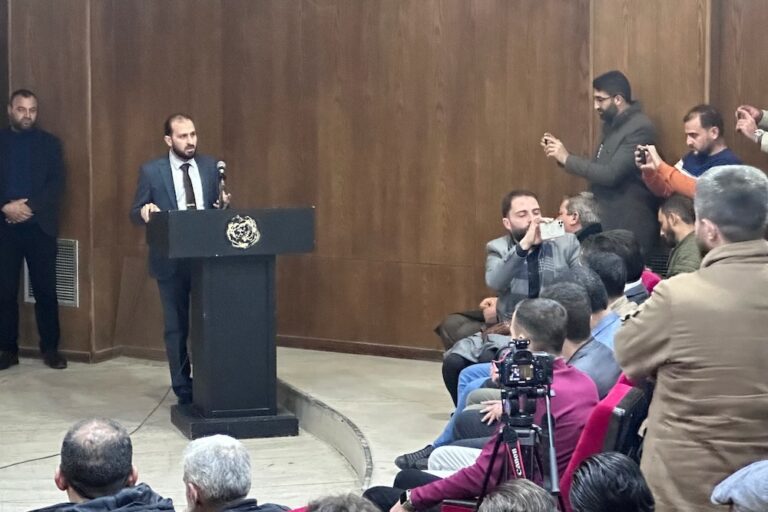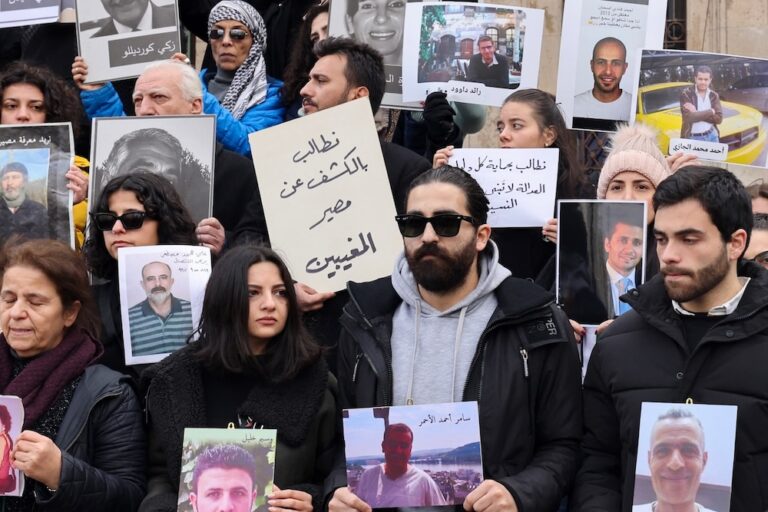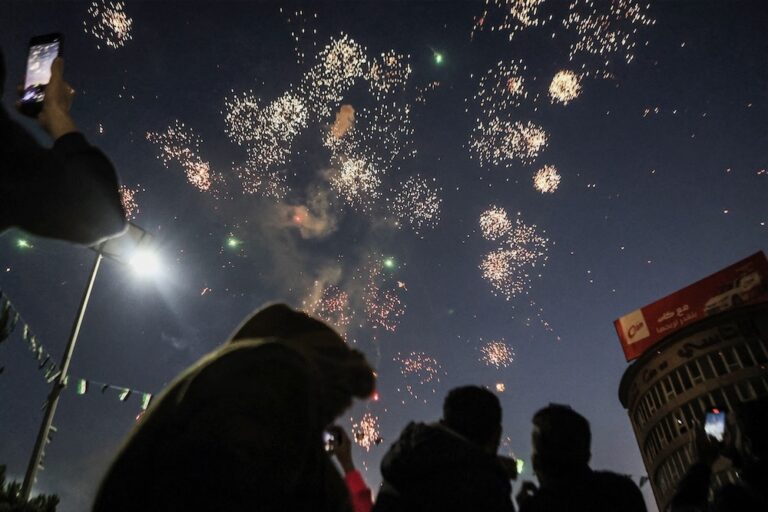(HRW/IFEX) – The following is an abridged version of a 24 February 2009 Human Rights Watch press release: Syria: Dissolve the State Security Court EU and US Should Engage Damascus to Abolish Repressive Court (New York, February 24, 2009) – Syrian authorities should abolish the Supreme State Security Court (SSSC), a special court that exists […]
(HRW/IFEX) – The following is an abridged version of a 24 February 2009 Human Rights Watch press release:
Syria: Dissolve the State Security Court
EU and US Should Engage Damascus to Abolish Repressive Court
(New York, February 24, 2009) – Syrian authorities should abolish the Supreme State Security Court (SSSC), a special court that exists outside the ordinary criminal justice system to prosecute those perceived as challenging the government, Human Rights Watch said in a report released today.
In the 73-page report, “Far from Justice: Syria’s Supreme State Security Court,” Human Rights Watch documents how the SSSC has relied on sham trials to prosecute at least 153 defendants since January 2007 on the basis of vague charges that criminalize freedom of expression. Those prosecuted include 10 bloggers, 16 Kurdish activists, and eight citizens accused of “insulting the Syrian president” in private conversations.
The report is based on interviews with former defendants before the SSSC, their lawyers, and human rights activists in Syria, as well as an extensive review of trial notes taken by Western diplomats, who are the only outside observers to have had access to the court. Human Rights Watch has extensively compiled information on the trials of and charges against 237 detainees, representing all cases known to have been decided by the SSSC between January 2007 and June 2008, and analyzed the charges brought in these cases, the categories of detainees prosecuted, the administration of justice at their trials, and their terms of sentencing.
“The State Security Court is one of Syria’s main pillars of repression,” said Sarah Leah Whitson, Middle East director at Human Rights Watch. “It’s a kangaroo court providing judicial cover for the persecution of activists, and even ordinary citizens, by Syria’s security agencies. Defendants have no chance of defending themselves, much less proving their innocence against the bogus charges brought against them.”
By decree, the SSSC is exempt from the rules of criminal procedure that apply in Syria’s criminal courts. Defense lawyers play a largely ceremonial role in a charade of due process. They usually see their clients for the first time on the day of the trial and the court denies them the opportunity to engage in oral defense or call on witnesses. Most trials consist of four short sessions, often less than 30 minutes each. Defendants have no right to appeal their verdict to a higher tribunal.
Human Rights Watch found that security forces detain defendants scheduled to appear before the SSSC for long periods of time – usually for months – before informing them of the charges against them. Defendants frequently allege that Syrian security services tortured them to extract their confessions, but the court does not investigate the allegations or reject the confessions. The SSSC sentenced the vast majority of defendants who appeared before it during the 18-month period from January 2007 to June 2008 on the basis of its vaguely defined, overbroad “security laws,” most typically the charge of “spreading false or exaggerated information that weakens national sentiment.”
“In the name of protecting ‘national sentiment,’ the SSSC jailed more than 100 people last year,” Whitson said. “It is not these defendants who weaken national sentiment, but the practices used by the Syrian state to silence them.”
Since 1992, when it resumed its activities after a hiatus in the 1980s, the SSSC has tried thousands of people. The largest category of defendants before the SSSC in the last three years includes those labeled as “Islamists”; their chief “crime” appears to be that many possess CDs or books by fundamentalist clerics. The SSSC has also tried Kurdish activists, bloggers, writers, and private citizens, like Muhamad al-Husseini, 67, whom the SSSC sentenced to three years in jail in 2007 because the security services reportedly overheard him “insulting the Syrian president” and criticizing corruption in Syria while sitting at a popular cafe in Damascus. In one case, the government prosecuted a Syrian citizen after informants said he had insulted President Bashar al-Asad while watching television at his uncle’s home.
“It appears that ordinary Syrians who aren’t engaged in any political activity cannot have a private conversation, exchanging opinions about their government, in a restaurant or even in their own homes,” said Whitson. “Instead of addressing the country’s genuine problems of poverty, corruption, and a stunted political environment, the Syrian authorities expend national resources spying on their own people.”
The European Union and the United States have been eager to engage with Syria recently. Human Rights Watch urged these governments to communicate their strong disapproval of the SSSC and to condition any further progress in their relations with Syria – notably the entry into force of the Association Agreement between Syria and the European Union – on abolition of the SSSC and concrete improvements in Syria’s human rights situation.
Human Rights Watch also called on the Syrian authorities to:
– Abolish the court and create an independent judicial commission to review the existing cases before the SSSC;
– Order the release of defendants facing prosecution solely for exercising their freedom of expression or association; and
– Transfer to regular criminal court those cases where there is probative evidence that the defendant committed recognizable criminal offenses.
The report also urged Syria to decriminalize free expression and peaceful association by revising the vague and overbroad statutes in the penal code that the authorities use to prosecute individuals for speaking their minds or holding a meeting.
For the complete text of the press release, see: http://www.hrw.org/en/news/2009/02/24/syria-dissolve-state-security-court
The Human Rights Watch report, “Far From Justice: Syria’s Supreme State Security Court,” is available at: http://hrw.org/en/node/80952/
For more Human Rights Watch reporting on Syria, please see:
– “The Forgotten Damascus Spring,” commentary by Nadim Houry, published in the Guardian on February 22, 2009: http://www.guardian.co.uk/commentisfree/2009/feb/20/syria-humanrights
– Syria country page: http://www.hrw.org/middle-eastn-africa/syria


